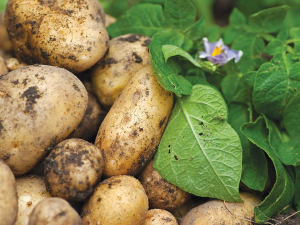'Foodie February' spotlights New Zealand potatoes
This year, 'Foodie February' sees potatoes take the spotlight as one of New Zealand's most powerful and versatile food heroes.
 Potatoes New Zealand annual report says the overall value of the industry including the domestic and export markets was $1.095 billion.
Potatoes New Zealand annual report says the overall value of the industry including the domestic and export markets was $1.095 billion.
Despite facing major challenges, New Zealand's potato industry remains a billion dollar business.
Data from 2021 presented in the Potatoes New Zealand (PNZ) annual report shows minimal impact on production despite a rough couple of years. The overall value of the industry including the domestic and export markets dropped slightly to $1.095 billion. The domestic market dropped slightly from $1,054,857 to $993,447 in value.
However, growers believe their industry remains under pressure despite the pandemic disruption abating. Potato growers across the country say they have continued to navigate regional plan changes, restrictive government policies, ongoing pest challenges, weather events and rising costs of production.
Despite all of this, growers have continued to deliver to markets the best NZ potatoes and produce the best NZ potato products, the report says.
In its annual report, PNZ explains that the sustainability challenges for industry include:
- how to remain viable during the rollout of government policies.
- adapting to climatic changes and mitigating impacts from extreme weather events.
- managing pests and disease; all whilst maintaining economic vigour.
"Most farmers are aware of the challenges on their own farms, as we've heard at the PNZ grower insight meetings held last year."
PNZ officials visited Pukekohe, Canterbury and Palmerston North throughout the year, to ensure they stayed abreast of current challenges and heard directly from potato growers.
"Although the pandemic resulted in a cancelled biennial conference, we continued stakeholder engagement with smaller regional events to update industry on our activities."
PNZ says the solutions to industry challenges are being sought in research and development programme.
The NZ Potato Growers' Levy is only spent on research, development, and extension (RD&E) activities, as directed by growers at the time of the last levy vote in 2019. Last year $1.9 million was spent on RD&E and there are currently seven projects on the go.
The two biggest projects are the Canterbury Potato Liberibacter Initiative (CPLI) and the Sustainable Vegetable Systems Programme (SVS).
Both projects look at sustainable quality and environmental sustainability.
The new CPLI programme, launched in November 2021, extends on the previous work of Plant and Food Research Institute's psyllid projects and is led by the newly formed Canterbury Psyllid Liberibacter Initiative (CPLI).
CPLI is a collective of like-minded farmers and industry representatives wanting to combat the devastating impact of the Liberibacter (Lso) bacterium which causes Zebra-chip in potato crops.
CPLI is funded with a special Canterbury grower/processor levy and in-kind support from PNZ. Research from the programme will be shared with the whole of industry. The work is being undertaken both at Plant and Food Research (PFR) and by Lincoln University Masters students, on growers' properties.
PNZ says this all builds on the previous projects which examined spray programme, day degree monitoring and psyllid behavioural research.
The SVS is in its third year and is making progress towards improving tools and guidelines for the New Zealand vegetable sector's nitrogen management, according to PNZ.
SVS is funded by Ministry for Primary Industries, led and co-funded by PNZ in collaboration with the Vegetable Research & Innovation Board and Horticulture NZ. SVS is a $7.5 million-dollar national project, spread over 4 years and has multiple workstreams.
"The programme outputs include providing analysed trial results and subsequent modelling of the vegetable nitrogen system," says PNZ.
"This is presented as nitrogen budgets. Plant and Food Research Institute are conducting the field, laboratory and modelling research. Trials and monitoring take place both at PFR and on growers' properties."
The SVS programme aims to maintain the vegetable and potato industries' social license to operate.
Horticulture New Zealand (HortNZ) has added its perspective to numerous primary sector voices urging the Government to strengthen its draft legislation to replace the Resource Management Act (RMA).
The Commerce Commission has finalised new information disclosure requirements for local councils and water organisations that deliver water supply and wastewater services.
Beef + Lamb NZ (B+LNZ) is calling for significant changes to the Government’s reforms to the Resource Management Act (RMA).
NZPork says the Government needs to strengthen its proposed planning laws to ensure New Zealand's pig farmers can continue to produce pork.
Good news for kiwifruit growers - a record crop with forecast per hectare returns at record levels for all fruit categories for the 2025-26 season.
As guests gathered on what is known as the Speaker's Lawn - a beautifully manicured patch of grass behind the main buildings of Parliament - to mingle and enjoy a lamb chop to celebrate National Lamb Day, the mood was very much upbeat.

OPINION: The proverbial has really hit the fan in Wellington and exposed a glaring example of a double standard in…
OPINION: Dark suited spin doctors exist to, well, spin, and the nice cuddly progressive types at Greenpeace Aotearoa practice this…